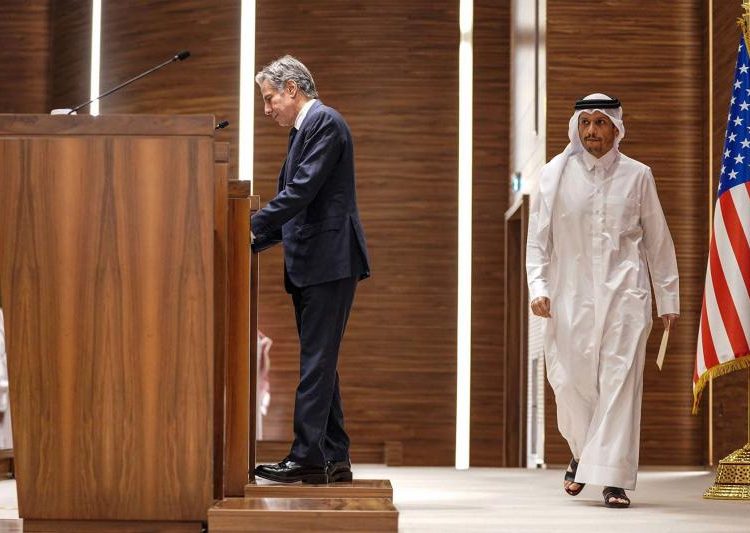Recent developments in the Middle East have drawn attention to the intricate web of diplomacy and military engagement involving key players such as the United States, Israel, Iran, and various Arab states. In the wake of recent diplomatic tours by Iran’s Foreign Minister Abbas Araghchi in the Middle East, U.S. Secretary of State Antony Blinken embarked on a parallel journey to the region. His visits to Israel, Saudi Arabia, and Qatar, followed by meetings with Jordanian and Emirati counterparts and the Prime Minister of Lebanon in London, signal a renewed American effort to assert influence amidst ongoing military conflicts. But what objectives underpin Blinken’s regional engagements?
Assurance to Regional Allies
One of the primary goals of Blinken’s visit appears to be providing reassurance to the Arab countries in the region, particularly in the face of heightened tensions stemming from Israel’s actions in Gaza, Lebanon and against Iran. The United States appears intent on urging Middle Eastern allies to stand alongside Washington and Tel Aviv, or at least refrain from adopting stances against Israel. By highlighting Israel’s recent actions purportedly weakening the “Axis of Resistance,” the U.S. seeks to fortify its alliances and widen the gap between Iran and Arab countries. Reports in American media, including The New York Times and CNN, suggest that regional countries like Saudi Arabia and the United Arab Emirates are pursuing de-escalation and diplomatic agreements with Iran. Washington, therefore, dissuades these countries not to gravitate towards Tehran and to maintain a strategic distance.
Arab countries are apprehensive about escalating crises that could jeopardize their own security. The U.S. likely aims to reassure them of its support, emphasizing that Israel’s actions are intended to be calculated and controlled to prevent a full-scale regional war. However, Iran Nuances learned that some Arab states have conveyed to the U.S. their reluctance to partake in actions against Iran. Tehran, through diplomatic channels involving over ten countries, has warned Washington that any aggression originating from U.S. bases in the region would elicit a proportional response to the source of the attack.
Lebanon’s Complex Political Landscape and External Influences
Beyond these dynamics, the U.S. is also focusing on areas like Lebanon. Following recent Israeli actions targeting senior leaders of Hezbollah, the US and some international actors perceive an opportunity to influence Lebanon’s political equilibrium, potentially implementing UN Security Council resolutions like 1701 with a bias favoring Israel. Discussions have even broached the execution of Resolution 1559 from 2004 which calls for the disarmament of Hezbollah. However, Lebanon’s current political environment remains resistant to such maneuvers. Key political factions uphold that Hezbollah, as a significant entity in Lebanon’s political sphere, must be included in decision-making processes. Militarily, Hezbollah’s recent operations against various targets in Israel have demonstrated the group’s enduring capabilities.
The U.S. Support for Israel
Since the onset of the conflict in Gaza and its spillover into Lebanon, the United States has unequivocally supported Israel militarily, intelligence-wise, and politically. Israel has killed over 43,000 in Palestine and over 2,000 in Lebanon, predominantly among civilians, in its year-long aggressions. Amid rising tensions between Iran and Israel, the U.S. has made its involvement more conspicuous, recently announcing the deployment of the THAAD missile defense system in Israel as a countermeasure against potential responses from Iran and its allies. Politically, Washington continues to bolster Israel’s position, with Blinken’s regional tour viewed as an extension of U.S. efforts to rally support for its ally.
Blinken’s visit follows Iranian top diplomat’s tours to the Middle East that reportedly achieved a consensus on the necessity to halt Israeli aggressions in the region. Part of the U.S. Secretary of State’s mission is to mitigate this emerging consensus and realign regional support in favor of Israel. The timing of Blinken’s trip, notably after reports of killing figures like Hamas political leader Yahya Sinwar, is seen as an attempt to project the weakening of resistance groups and to secure compromises for Tel Aviv.
With the war in Gaza more than one year old, Israel has so far failed to accomplish its declared goals in the field. The recent assassinations may also be leveraged by the U.S. and Israel as a means to demonstrate tactical success, managing to portray and translate them as strategic gains.






